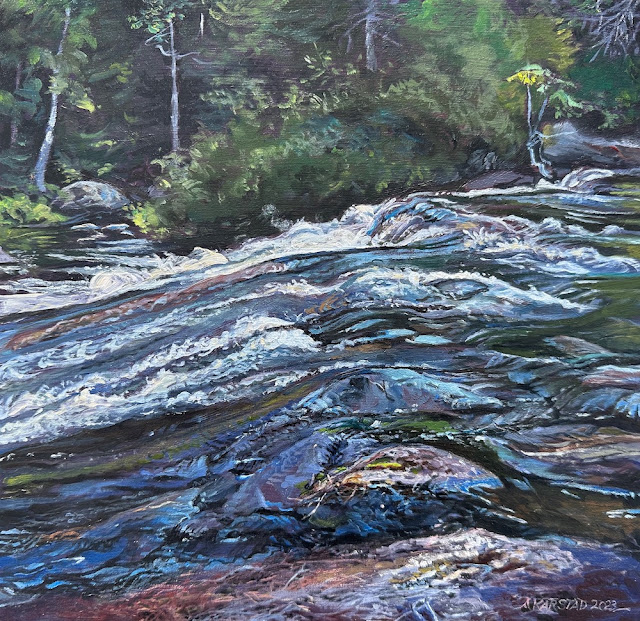Ottawa River Drum (oil on canvas 12 x 24 in) Sold
31 July finds me admiring the active "s"-curve in the spine of a very inactive fish - the carcass of a Drum (Aplodinotus grunniens) which Fred found washed up on a narrow shale beach of the Ottawa River in Rockland, Ontario. It is a hot day, and I've moved the dry, partially skeletonized fish to into the shade of a willow bush and set up to paint. The wind
freshens and the little waves lap more urgently at the stones, frothing around the back of the Drum. Dark clouds amass over the north shore, rolling quickly toward us from the north west. I'm glad that I took photos when I started - it looks as if I'll have to finish this one in the studio!
freshens and the little waves lap more urgently at the stones, frothing around the back of the Drum. Dark clouds amass over the north shore, rolling quickly toward us from the north west. I'm glad that I took photos when I started - it looks as if I'll have to finish this one in the studio!
There are 160 species of Drum in the world, and the Sheepshead, Aplodinotus grunniens, is the only one that lives in fresh water! All the rest of its relatives are marine. It survived glaciation in the US Mississippi River, and has achieved the greatest latitudinal range of any North American freshwater fish, by spreading north through Manitoba to Hudson's Bay, while it's also found as far south along the Caribbean as Guatemala.
Fred and I are familiar with Drum from the Great Lakes, where we saw carcasses washed up on beaches. Before the invasion of Zebra Mussels, these were characteristically starved-looking 30cm relative youngsters, while now the Drums we see tend to be larger and in good condition, as if they'd died from some accident rather than starvation.
We first became interested in the Ottawa River populations when we began to fret about why the beautifully winged, pink shelled clam, Potamilis alatus, was historically rare in the Ottawa River. It turned out that the Drum, its host fish, was also uncommon, which might have been the cause of the mussel's rarity. Now there are more Drums here, and we're also finding more of these lovely "rare" mussels - however, Fred cautions me that we don't know enough about either of them to say that the increase of the fish may have caused the apparent increase of the mussel.
Aplodinotus is also the host of Leptodea fragilis, the other distinctive, similarly-winged survivor, the Ottawa River being their refuge as Zebra Mussels wipe out native mussel populations in similar habitats elsewhere. Zebra Mussels have taken over the Rideau and the South Nation, and are increasing to dangerous levels in the Mississippi, but the Ottawa's water is too low in calcium for Zebras to flourish.
In addition to being an important host for mussels, the Sheepshead also feeds on Molluscs, crunching them up with its pebble-like pharyngeal teeth, and this has made it an important predator of Zebra Mussels! Zebras don't live here, in the calcium-poor Ottawa River, but they do throng the nearby calcium-rich South Nation River, where a recent youth fishing event produced a gallery of photos of smiling youngsters hoisting big fat-looking Drum, rather than the Sunfish and Crappies they'd have caught before the Zebras invaded.
In Fred''s perusal of the river edge at Rockland, he found it to be "just mattressed" with drifted vegetation from this spring's floods, but he found no mollusc shells - just a handful of shed skins of little crayfish. The pointed front projections of their carapaces seem pinched from side to side like Orconectes rusticus, and we did find live "Rusties" later in the day at the Cumberland Masson-Angers ferry dock. Fred suspects that they've taken over the Crayfish niche in this stretch of the Ottawa River.
This painting is for sale at $550, with a special discount for online purchase.
To view discounted price, please select correct dimensions in the drop-down menu below.




Comments
Post a Comment
What do you think of this painting, and what do you know about the subject that I have painted?